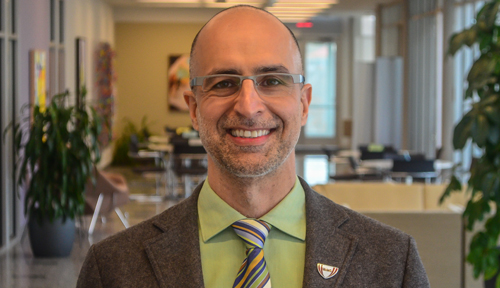What is the impact of tobacco marketing on smokers? Researchers at UNMC and Roswell Park Cancer Institute (RPCI) are asking that and other questions in a study which will examine point-of-sale tobacco advertising and smoking habits.
The three-year, $1.4 million study is being funded by the National Cancer Institute, which is part of the National Institutes of Health.
“There is a gap in our knowledge about how tobacco marketing in stores affects smoking cessation, and our study will help fill this void,” said Mohammad Siahpush, Ph.D., professor at the UNMC College of Public Health. “Our goal is to examine how variations in tobacco marketing in stores influence attempts and success in stopping smoking.”
The tobacco industry spends $12.5 billion a year on marketing in the United States. As avenues for traditional tobacco marketing such as electronic, billboard, and print forms are restricted, the industry has come to rely on marketing at retail stores to advertise and promote their tobacco products. This study will help to inform health care professionals about how exposure to tobacco marketing inhibits smoking cessation.
Researchers are seeking approximately 1,000 smokers who are 18 years of age and older, have smoked more than 100 cigarettes in their life, currently smoke five or more cigarettes per day and live in the City of Omaha. Smokers will be asked to respond to a 30-minute telephone survey and, in six months, a 15-20 minute follow-up telephone survey. Eligible participants will receive a compensation for their time. For more information about participating in the study, see sidebar at right.
Information will be collected from participants on a variety of smoking topics, such as their cravings to smoke, urge to buy cigarettes, unplanned purchases of cigarettes and how much they notice tobacco marketing. Interviews will be conducted by the Survey Research and Data Acquisition Resource (SRDAR) at Roswell Park Cancer Institute in Buffalo, N.Y.
Data also will be gathered about tobacco marketing from stores that sell tobacco in each participant’s neighborhood. This study is believed to be the first smoking cessation study to use geographical information technology to link tobacco marketing data from retail stores to information collected from smokers.
“The information obtained from this study will contribute to a greater understanding of the factors that impact smoking behavior,” said Andrew Hyland, Ph.D., chair of the Department of Health Behavior at RPCI. “The study results can guide health care professionals as they consider policies that support tobacco cessation and will ultimately help smokers quit.”
